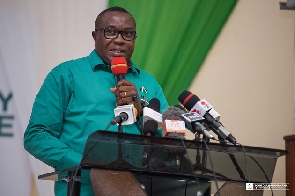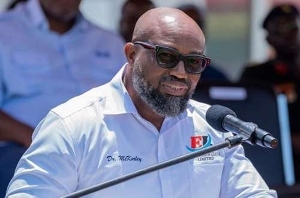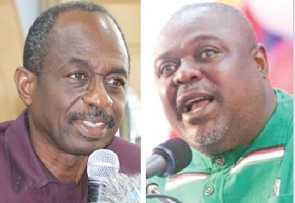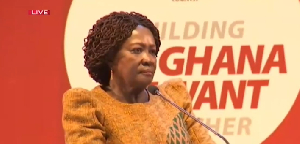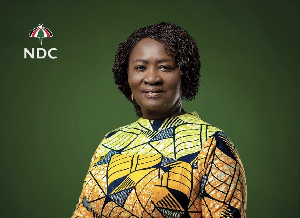the healthcare system in Ghana.
J. O. Cruickshank
With the near collapse of the countries of Guinea, Liberia and Sierra Leone from the recent Ebola epidemic in mind, the strategic implications of a robust healthcare system to the survival of a nation cannot be overstated. Because most of us, if we are lucky, encounter the healthcare system infrequently and very often on a less than emergency basis, its critical importance to the existence of the nation state is very often overlooked. Overlooked, that is, until something like the recent strike by the members of the Ghana Medical Association (GMA) wake us up to this fact.
Most of us, by way of analogy, never need the Fire Service either and when we do, it is most likely to put out a small localized fire. The Fire Service thus operates most of the time like the healthcare industry, putting out small fires here and there. But governments generally recognize the strategic importance of the Fire Service and so most structure their Fire Departments from that perspective. The Fire Service is, in almost all societies, a pseudo-military organization and is operated as such. Firemen, in general, are not allowed to go on strike and watch communities burn while negotiating their benefit packages. It is obvious that, despite the parallels with the Fire Service as an example for us, we have not structured our health service cognizant of its strategic nature such that it is immune to the kind of pressures we just witnessed with the strike by the GMA. Apparently, this strike was curtailed due to the intervention of Chiefs, religious leaders and other prominent personalities. But what if they had failed? Would Ghanaians still be dying in the streets to this day? I would suggest that this is no way to run an asset as important as the public health service.
Let us start by analyzing this ongoing problem. It is my understanding that strike action by doctors in Ghana is almost a yearly phenomenon. Its genesis clearly lies in the fact that once a doctor graduates from the government funded medical schools, government for all practical purposes, loses all bargaining power over him or her once they enter the public service. Doctors’ critical role in sustaining and keeping the population in good health guarantees that whatever demands the GMA makes on their behalf, especially when backed by the threat of withdrawal of service or resignation, government finds itself in a relatively weak position since the alternative to meeting their demands is to watch Ghanaian die from lack of medical attention. As any military strategist will tell you, however, a key element to overcoming an enemy in time of war is to identify its logistical chokepoints and cut off its supply lines at that point. Metaphorically speaking, a state of semi-permanent warfare appears to exist between the GMA and government and the government has so far been reactive rather than proactive, thereby giving the tactical advantage to the GMA. The resolution of the recent crisis is a very tentative truce at best. But government is not as powerless as it sees itself. It has simply not analyzed the situation with the necessary tactical and strategic rigor it deserves. Literally speaking, the chokepoint in the supply lines of the GMA are the very same government funded medical schools that fill the GMA’s ranks on a continuing basis. And this is where government, by the deft application of appropriate tactical strikes and strategic maneuvers, could start the process of removing the stranglehold the GMA appears to have over the Ghanaian peoples.
The basic idea derives from one already in existence in the United States. In the US they have an establishment called The United States Public Health Service Commissioned Corps (USPHSCC). It is affiliated with the United States Department of Health and Human Services or what we might think of as the “United States Ministry of Health”. These uniformed officers, with ranks similar to those of their United States military counterparts, are healthcare professionals, i.e. doctors, pharmacists, etc. Indeed, some of the United States “military” personnel sent over to Liberia during the Ebola crisis were from this organization. They are available to serve the United States Government’s medical objectives when private medical help is unavailable. The idea proposed here is very similar. We would plan on reorganizing our public healthcare system along similar lines; a new “Ghana Public Health Service Commissioned Corps”, staffed by the commissioned officer graduates of our publicly funded medical, pharmacy and nursing schools to serve the public hospitals and clinics, not just in the case of emergencies but on a routine basis.
The government would start the process of obtaining the upper hand in this deadly game of chicken between itself and the GMA by declaring that, with immediate effect, all current and new students admitted to the state owned medical schools will be deemed Officer Candidates similar to the Officer Candidates at the Teshie Military Academy. Current students at the medical schools who do not wish to undergo this transformation will be free to terminate their relationship with these schools upon the introduction of this plan. Their places, I am sure, will be quickly taken up by a new and eager crop of students. Upon graduation, these former students will become the equivalents of regular military officers in the combat arms except they will be members of the GPHSCC, attached to the Ministry of Health. They will, however, be subject to all the military rules, regulations, benefits and privileges just as the members of the USPHSCC are in the United States. Recall that these graduates were free not to enroll or continue in these schools if they objected to being in this situation. Suffice it to say, withdrawal of service by members of the GPHSCC will not be an option, neither will belonging to a union or some similar civilian organization such as the Ghana Medical Association. As the size of the GPHSCC grows over time, filled with future graduates of the medical schools, there should be a corresponding shrinkage in the size of the GMA membership, at least within the public health sector and the GMA’s grip on the nation’s throat should begin to slacken noticeably.
In this proposal, I use the term “doctor” as a shorthand for all the critical professions in the medical delivery system including pharmacists and nurses. All professions truly deserving to be part of the GPHSCC would be identified by the Ministry of Health, subject perhaps to review by some outside body. Such a review would prevent over-eager bureaucrats from listing every conceivable profession associated with healthcare delivery as being essential to the national security and thus folded into the GHPSCC. Also, there is no need for other public servants in the non-medical professions in Ghana to be subjected to similar pseudo-military service as some might be tempted to suggest simply for the sake of equity, because, important as they are, I do not believe any others rise to the national security dimensions of the medical delivery teams. The withdrawal of service by architects, engineers, teachers and accountants, important as these professions are in our daily lives and inconvenient as such service withdrawal action might be, I do not believe that they have the power of intimidation that the doctors through the GMA have. The collapse of the healthcare system poses an existential risk to the nation at levels far higher than similarly for any other parts of our civilian professional infrastructure.
This would clearly be a major departure from the current laissez-faire approach to employing and deploying healthcare professionals in Ghana but it recognizes and affirms the role of healthcare as one of the key elements necessary to a nation’s survival and the enjoyment of life by its citizens. It also removes, at least over time, the existential risk posed by the unchecked power of the GMA based on its members’ critical role in maintaining the nation’s health. The three unfortunate West African countries demonstrated the strategic nature of a nation’s healthcare system beyond any serious debate. The time for putting a revamped and a more robust healthcare service in place is right now. Hopefully the proposal discussed above could be the start of a national debate and reform. As a famous American politician once said, “We should never let a good crisis go to waste.”


